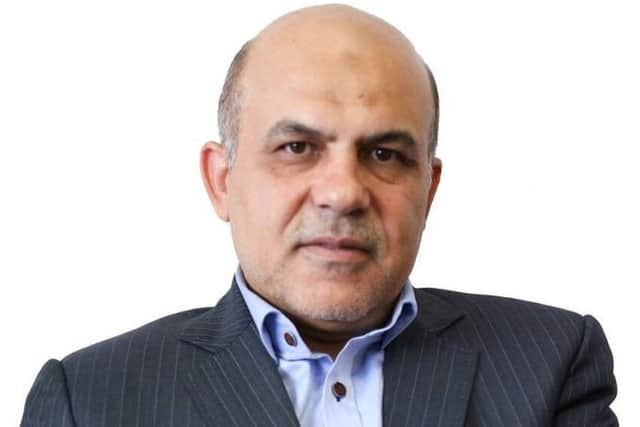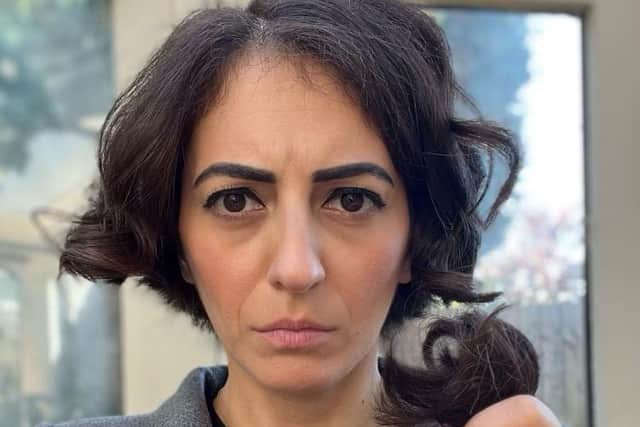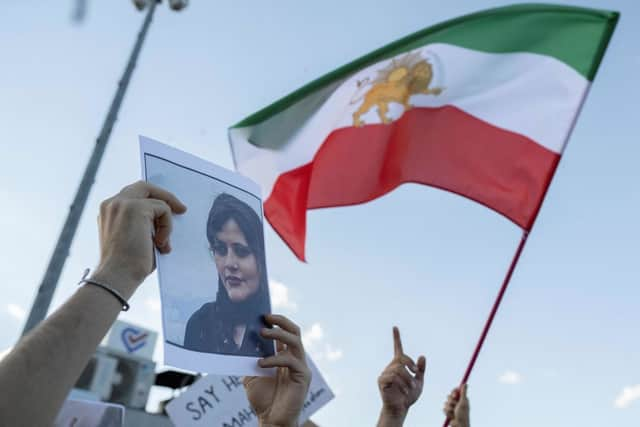Iran: British-Iranian citizen Alireza Akbari sentenced to death for spying for UK - what James Cleverly said
and live on Freeview channel 276
The family of a British-Iranian dual national has warned that authorities in Iran are preparing to execute him.
Alireza Akbari’s wife, Maryam, has told the BBC that she and other family members have been asked to go to his prison for a “final visit”. The UK has urged Iran to halt the execution and immediately release Mr Akbari.
Advertisement
Hide AdAdvertisement
Hide AdMr Akbari was arrested in 2019 when the Iranian Government accused him of spying for the UK. Iran’s intelligence force claimed it had unmasked Mr Akbari, who served as Iran’s deputy defence minister under former president Mohammad Khatami until 2001, by feeding him false information and described him as “one of the most important infiltrators of the country’s sensitive and strategic centres”.
Iranian state television recently released a heavily edited video of Mr Akbari allegedly confessing to giving the British reports on Iran’s nuclear programme and efforts to evade western economic sanctions. Mr Akbari however claims he was tortured and given mind-altering drugs to force him into confessing to crimes he did not commit, something Iran has a history of.
In the video, Mr Akbari was asked about the assassination of Iran’s top nuclear scientist Mohsen Fakhrizadeh, who was shot dead in in Tehran in 2020. He said: “They wanted to know about high-ranking officials depending on the major developments … for example [a British agent] asked me whether [Mohsen] Fakhrizadeh could be involved in such and such projects, and I said why not.”


A little over three months ago, Mr Akbari appealed against his death sentence, but his request was rejected and he has remained in prison since. It is unclear why security services have decided to now go ahead with imposing the death penalty.
Advertisement
Hide AdAdvertisement
Hide AdUK Foreign Secretary James Cleverly wrote on Twitter: “Iran must halt the execution of British-Iranian national Alireza Akbari and immediately release him. This is a politically motivated act by a barbaric regime that has total disregard for human life.”
A Foreign Office spokesperson meanwhile told the BBC that it was supporting Mr Akbari’s family and had been in touch with Iranian authorities about his case only a few days ago. The UK has requested urgent consular access, but Iran does not recognise dual nationality for Iranians.
Both Mr Akbari’s family and the UK Foreign Office decided against publicising the case when he was arrested more than three years ago, as they hoped he would be released as part of an internal appeal process. But family members urged the UK to intervene when the Iranian Government indicated his execution was imminent.
Maryam, who is based in London, told The Guardian she feared her husband would be executed within the next 24 hours. She said: “He is entirely innocent and the victim of political games inside the country.”
Advertisement
Hide AdAdvertisement
Hide AdA family friend added: “It’s like an explosion in the life of a person who devoted his life to protect his country. Even if the UK Foreign Office can buy time for their citizen to see and speak to his family, that would relieve some pressure.”
When Iran’s judicial news agency, Mizan, confirmed the death penalty for Mr Akbari, it claimed he was “one of the most important agents of the British spy service”. It added that he had “collected important information and provided this for the British spy service in a fully informed and targeted manner”.
BBC Persian has released an audio message from Mr Akbari in which he explains how he was arrested and sent to Evin Prison. He claims that when he was living abroad a few years ago, he was invited to visit Iran at the request of a top Iranian diplomat who was involved in nuclear talks with world powers.
But once there, he was accused of obtaining top secret intelligence from the secretary of Iran’s Supreme National Security Council, Ali Shamkhani, “in exchange for a bottle of perfume and a shirt”. Mr Akbari claimed he was tortured into giving a false confession: “By using physiological and psychological methods, they broke my will, drove me to madness and forced me to do whatever they wanted. By the force of gun and death threats they made me confess to false and corrupt claims.”
Advertisement
Hide AdAdvertisement
Hide AdHe also accused Iran of seeking “to take revenge on the UK by executing me”. His wife added: “There is no evidence that he was a spy except a confession that was extracted after he was drugged and interrogated for 3,500 hours. He loves his country, but this is part of a political power game inside Tehran. His only contacts with British officials were those permitted by his official status.”


Iran has arrested dozens of Iranians with dual nationality or foreign permanent residency in recent years, usually on spying and national security charges. Just last year, British-Iranian citizens Nazanin Zaghari-Ratcliffe and Anoosheh Ashoori were released and allowed to leave Iran after the UK settled a long-standing debt owed to Iran.
Mr Ashoori’s daughter, Elika Ashoori, told NationalWorld: “The Islamic Republic is a crumbling regime and has very few cards left to play. They are continuing to test the boundaries of international response to their crimes and by advancing from issues death sentences of mono to dual nationals, they are trying to gauge the severity of the consequences faced by the West.
“This is why it is crucial now more than ever for the UK to take a strong political stance, prescribe the Islamic Revolutionary Guard Corps as a terrorist organisation, and impose sanctions in full on the regime.”


Advertisement
Hide AdAdvertisement
Hide AdIran has been handing out more and more death sentences recently as it cracks down on activists protesting against its regime. Protests began in September after the death of 22-year-old Mahsa Amini, who was arrested after allegedly not adhering to hijab rules and tragically died in police custody.
The Human Rights Activists’ News Agency (HRANA) reports that since then, at least 516 demonstrators, including 70 children, have been killed as Iran’s ‘morality police’ violently cracks down on protesters - with a further 19,262 arrested. Many prisoners have also been sentenced to death, and so far, there have been four known executions.
These include Mohammad Mehdi Karami, a karate champion, and Seyed Mohammad Hosseini, a volunteer children’s coach, who were executed on Saturday (7 January), Majidreza Rahnavard, who was publicly hanged from a construction crane on 12 December, and Mohsen Shekari, who was the first protester to be killed.
Human rights groups have condemned their trials as a “sham” and warned that more executions are to come.
Comment Guidelines
National World encourages reader discussion on our stories. User feedback, insights and back-and-forth exchanges add a rich layer of context to reporting. Please review our Community Guidelines before commenting.
